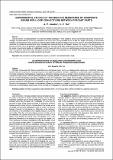| dc.contributor.author | Varabei, Alexander Petrovich | |
| dc.contributor.author | Tur, Victor Vladimirovich | |
| dc.coverage.spatial | Brest | ru_RU |
| dc.date.accessioned | 2023-03-06T09:25:40Z | |
| dc.date.available | 2023-03-06T09:25:40Z | |
| dc.date.issued | 2022 | |
| dc.identifier.citation | Varabei, A. P. Experimental studies of the bending resistance of composite beams with loop connections between precast parts / A. P. Varabei, V. V. Tur // Vestnik of Brest State Technical University. – Brest : BrSTU, 2022. – № 3. – P. 20–26. – Bibliography: p. 26 (11 titles). | ru_RU |
| dc.identifier.uri | https://rep.bstu.by/handle/data/32730 | |
| dc.description | Воробей А. П., Тур В. В. Экспериментальные исследования сопротивления изгибу сборно-монолитных балок с петлевыми стыковыми соединениями | ru_RU |
| dc.description.abstract | Loop connections for precast concrete structures have various advantages in terms of ease of setting, high flexibility and strength. Despite the advantages, the widespread use of the loop connection in the construction industry is limited due to the lack of a design methodology in performance standards. Several available design techniques outlined in various studies are empirical upper bound solutions based on experimental observations and results that do not take into account all the factors that affect loop connection behavior and strength. However, the influence of the main parameters of the loop connection cannot be ignored for detailed evaluation and decision making when designing these elements. In this regard, this article presents the results of experimental studies of prefabricated monolithic beams with loop connections on self-stressing concrete and concrete on Portland cement. The distinctive features that affect the load carrying ability and the fracture behavior of such elements when using expansive concrete and concrete on Portland cement as a monolithic connection are revealed. | ru_RU |
| dc.language.iso | en | ru_RU |
| dc.publisher | BrSTU | ru_RU |
| dc.subject | напрягающий бетон | ru_RU |
| dc.subject | expansive concrete | ru_RU |
| dc.subject | beam elements | ru_RU |
| dc.subject | балочные элементы | ru_RU |
| dc.title | Experimental studies of the bending resistance of composite beams with loop connections between precast parts | ru_RU |
| dc.title.alternative | Экспериментальные исследования сопротивления изгибу сборно-монолитных балок с петлевыми стыковыми соединениями | ru_RU |
| dc.type | Статья (Article) | ru_RU |
| dc.identifier.udc | 624.012.45:539.413 | ru_RU |
| dc.abstract.alternative | Петлевое соединение для сборных железобетонных конструкций имеют различные преимущества, связанные с простотой установки, высокой гибкостью и прочностью. Несмотря на достоинства, широкое применение петлевого соединения в строительной отрасли ограничено из-за отсутствия методологии проектирования в нормативных документах. Несколько доступных методик к проектированию, изложенных в различных исследованиях, представляют собой эмпирические решения с верхней границей, основанные на экспериментальных наблюдениях и результатах, которые не учитывают все факторы, влияющие на поведение и прочность соединения. Тем не менее, влияние основных параметров петлевого соединения нельзя игнорировать для детальной оценки и принятия решения при проектировании данных элементов. В связи с этим, в данной статье представлены результаты экспериментальных исследований сборно-монолитных балок с петлевыми стыковыми соединениями на напрягающем бетоне и бетоне на портландцементе. Выявлены отличительные особенности, оказывающие влияние на несущую способность и характер разрушения таких элементов при использовании напрягающего бетона и бетона на портландцементе в качестве замоноличивания стыков. | ru_RU |
| dc.identifier.doi | https://doi.org/10.36773/1818-1112-2022-129-3-20-26 | |
